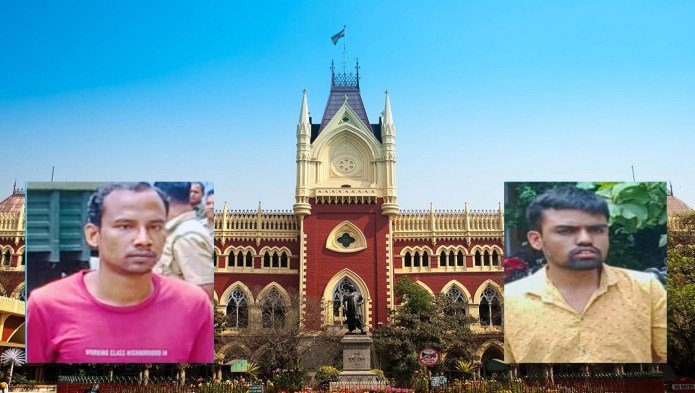On Wednesday (23rd July), the Calcutta High Court commuted death sentence of two men convicted of raping and murder a 5-year-old girl. A division bench comprising Justices Debangsu Basak and Md Shabbar Rashidi sentenced the convicts to life imprisonment taking note of the state’s submission that there is ‘possibility of their reformation’.
The bench was hearing the plea moved by convicts Fagun Mandi alias Pui and Rabindra Routh alias Bhaku against the 2023 trial court order and death sentence. The trial court had earlier given death sentence to the duo under Sections 376DB(gang rape), 302 (murder), 201 (causing disappearance of evidence), 363 (kidnapping) and 365 (kidnapping with intent to confine them) of the Indian Penal Code (IPC) and Section 6 of the Protection of Children from Sexual Offences Act (POCSO Act).
The prosecution had alleged that Fagun Mandi and Rabindra Routh had abducted the minor victim who was playing outside a Kali puja pandal. The duo raped the victim, strangled her and then hid her body in the year 2021.
On Wednesday, the Calcutta High Court ruled that the convicts will not be eligible for remission or premature release for the next 60 years. The court noted that the convicts first raped the minor girl and then bamboo sticks in her private parts.
While the bench highlighted the depravity of the convicted duo, the state submitted that the possibility of their reformation still exists.
Taking note of this, the court said that there needs to be a balance between the gravity of the offence and the punishment, the court ordered that the convicts will serve life sentence with no remission for a period of 60 years.
“In such circumstances, taking into consideration the respective age of the two appellants their socio economic background and mental health conditions as also the nature of the crime, we deem it appropriate to impose life sentence on both the appellants without the possibility of remission for a period of 60 years from the date of commission of the offence,” the Court ruled.
TMC government sympathised with rape convicts
Notably, the TMC government in West Bengal submitted that the perpetrators were from ‘socially backward’ background and ‘slow learners’ at school with little to no education.
Highlighting the contents of the state government’s report, the court stated, “Appellant No. 1 is a slow learner with severe speech problem. Financial condition of the appellant No. 1 and his family is very poor. Appellant No. 1 and his elder brother had worked under the same fishermen in a fishing trawler at sea. Report has noted that the family of appellant No. 1 is socially backward. Report has stated that is no criminal antecedent so far as appellant No. 1 is concerned. Family members of the appellant No. 1 is sympathetic to appellant No. 1. Report has noted that, the rectification process of the appellant No. 1 is working well at the correctional home.”

“Same report of the State has noted that appellant No. 2 attended primary school but was a slow learner. He had dropped out from the school after attending Class I due to educational dissatisfaction and improper guidance from his parents. Report has noted that the financial condition of the family of the appellant No. 2 is poor and that, his parents worked as labour at a local market. Family of the appellant No. 2 has been noted to be socially backward,” the court order reads.

However, the court said that it is not in a “position to say that release of any of the appellants on remission would not be a menace to the society.”
“Merely commuting the death penalty to one of life imprisonment simplicitor would not subserve the ends of justice in the facts and circumstances of the present case particularly given the nature of the offence committed by the appellants,” the court said.

